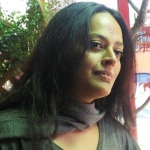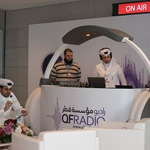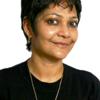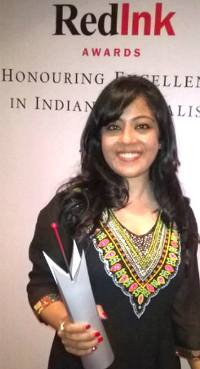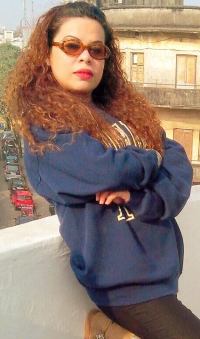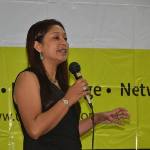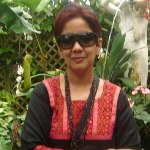As a young girl, August 14 was less of an expression of nationalistic pride in celebrating Independence Day than the naive enthusiasm of enjoying a national holiday.
The prospect of not going to school obscured my larger emotion of absorbing the implications of partition. I was a young girl in whom cynicism had not sunk in yet. It is only now when I look back at those days of unquestionable patriotism, that I feel sad, wishing I had more answers than the questions riddling my mind. Pakistan's creation should have meant independence. But it does not. Something was amiss... somewhere.
Despite the political realism following adulthood, my late father always ensured placing a huge Pakistani flag atop our house on August 14. With that, would begin our anticipation of the evening when the entire family would gather in the garden, over tea and delicacies. We would hear my father talk about his train journey from India to the newly created state of Pakistan. "I was almost killed travelling from Shimla to Lahore," recollected my father.
On the night of August 14, 1947, when the announcement of an independent Pakistan was made on Radio Pakistan, my father was in Shimla visiting his paternal uncle. He had to leave immediately for Jalandhar when he was told by his uncle that communal riots had gained severity. Not realising how dangerous the journey would be, my 19-year-old father planned to join his parents later in Lahore after they migrated from Jalandhar.
"I faced death many times. I was sure that I would be killed in the train before reaching Lahore," a look of intense excitement would pervade the faces among my family. I would bite unthinkingly into a tit-bit wondering why it was needed to put his life in danger just for the sake of reaching another city!
By the time he eventually reached Lahore a few days after partition, his family had actually given up hope of his survival. "They were sure I was killed in the riots," said my father laconically. It was only when Ammaji (my grandmother) embraced him with loud cries of disbelief and joy that my father understood the miracle of reuniting with his family.
"We lost relatives and friends in communal riots and not all of them were Muslims either," said my father. With the passage of time, the story of his survival remained the same as did its thrilling impact on listeners. What changed was the meaning of independence. For it no longer meant freedom.
Though my political consciousness was limited during the regime of General Ziaul Haq, I remember a sense of restlessness in my house when the country was forced to brandish its religiosity at all times. Religion was adopted as an official tool to suppress individual freedom. It was 1977 that a democratically elected government of Pakistan People's Party headed by Zulfikar Ali Bhutto was overthrown in a coup d'état by General Ziaul Haq.
For 11 years, the country's governing institutions were systematically eroded to turn it into a site of religious extremism. Islamisation had become an exaggerated form of nationalism enforced through various ordinances and amendments to the Constitution. Pakistan was entering a phase where religious concepts were going to be subverted to justify a dictatorial rule ostensibly supported by countries like the United States to arrest the danger of Communism posed by the Soviet Union.
Religious ideology and concepts were taught and encouraged at seminaries to refugees pouring in from neighbouring Afghanistan embattled by Soviet Union's invasion. The two most revered terms were 'jihad' and 'mujahideen'. Pakistan had become a state of Blasphemy Laws, the Hudood Ordinances and Qanoon-i-Shahadat. The term minority included religious minorities and women.
Using Islam as a point of reference public flogging, a practice in Saudi Arabia, besides silencing political dissent was used as a punitive method. I did not fully understand the long term consequences of Zia-ul Haq's actions, but I recall my family's resentment against the military regime's excesses. It was mandatory for official events to be preceded by recitation of the Quran, as Muslims government officials were required to break off for prayers and anyone caught eating publicly during Ramzan was penalised.
In 1980, the Federal Shariat Court was established consisting of eight judges, three of whom were ulema. The primary function of the Shariat Court was to ensure that laws enacted were not contradictory to Islamic values and mores. By situating Islam at the basis of polity the road to political disaster was judiciously laid out.
"How can he turn Pakistan into theocracy? Jinnah didn't fight for this!" I often heard my parents debate with friends and other members of family. The word theocracy took root in my mind making me wonder why my parents always discussed it with reference to the creator of Pakistan, Muhammad Ali Jinnah.
Raised by parents whose families had left India to make Pakistan a geo-political reality, the milestones set by the Zia-ul Haq regime had not completely sunk in. It would be left to General Pervez Musharraf's coup d'état in 1999 and events following the al-Qaeda attacks of September 11, 2001 in the United States to deconstruct Ziaul Haq's 11 years of Islamisation. August 14 would be remembered as a date of Pakistan's creation. Independence had yet to be acquired.
My father spiritedly narrated the story of his journey in 2004 for the last time. He passed away the following year. I remember asking him if he had expected the country to become what it had - a bountiful land for intolerance, religious extremism and lawlessness. "I've had my share of disappointments but they are nothing in comparison to what I have achieved. I know what this country means to me. You need to decide whether you will be guided by disappointments or what you think you have achieved."
For the past many years, I have struggled to pledge satisfaction at the course this country has taken. This year I found it extremely trying to pull out enthusiasm for August 14. The questions remained unanswered.
What were we celebrating? A farcical government set up to show the world that conceptual democracy was superior to inclusive democracy? Was a concept more important than the people? Was there any reason to celebrate 18 hours of power cut every day?
Instances of daylight mugging on the rise, religious extremism forcing families to leave their homes, a pattern of Shia killings in Balochistan and Khyber Pakhtoonkhwa? Self appointed adjudicators of moral turpitude? Families killed by unfluctuating drone attacks in North Waziristan?
It was difficult for me to celebrate. I did not have a story to keep me agog with enthusiasm. Not when one of my best friends was negotiating political space for herself as religious minority. Being a Christian, she was limited to a slot which confined her personal freedom and political ambitions. Certainly not when August 16, 2012 reminded me of my own precarious status as a citizen. Nearly 25 Shia men travelling to Baltistan, a mountainous region in northern Pakistan bordering China, were pulled off a bus by men dressed in army uniform and shot.
Incidents of Shia killings have continued unabated since the beginning of this year by religious extremist organisations that condemn Shias as 'kafirs' or infidels.
This year, I looked at the green and white flag which my father so proudly unfurled each year and decided to keep it folded. The white patch in the flag, representative of religious minority, now included Shias as well as all those who did not form part of the Muslim majority. I am a minority.
Find us on facebook: facebook.com/TheThumbPrintMag
The views expressed in the write-up are the writer's own and does not necessarily state or reflect the views of magazine

